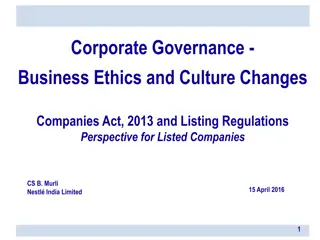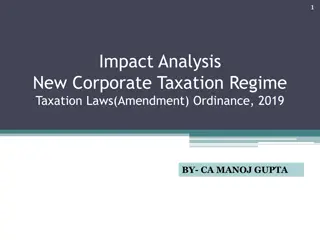Evolution of Companies and Global Business Impact
The presentation delves into the historical evolution of companies, from ancient multi-nationals to modern global corporations. It explores the intertwined relationships between economic expansion, colonialism, capitalism, and socialist movements. The presentation also discusses the role of companies in promoting social progress and sustainability, emphasizing the changing landscapes of global business over time.
Download Presentation

Please find below an Image/Link to download the presentation.
The content on the website is provided AS IS for your information and personal use only. It may not be sold, licensed, or shared on other websites without obtaining consent from the author. Download presentation by click this link. If you encounter any issues during the download, it is possible that the publisher has removed the file from their server.
E N D
Presentation Transcript
The role of companies in our modern global society An Overview of Global Business Imperial College Presentation Part 1 Tuesday 12th of January 2022 David Logan
Structure of the presentation Personal Introduction An Historical Perspective Our global society today Relations between the organised sectors A platform for social progress? Why would companies want to help? Human Psychology and relations between the Organised Sectors 2 Sustainability, simplified
Introduction to the Presenter 3 Sustainability, simplified
1. An historical perspective The first recorded multi-nationals where in Mesopotamia 2000BC 1600s: modern European multi-nationals emerge Dutch East India company (VOC) French Company des Indese British East India Company Tea Opium Sugar Growth of the first global economy led by the Western Powers There is a connection between economic expansion and European colonialism 4 Sustainability, simplified
1. An historical perspective 1900: the triumph of laissez-faire capitalism Moral/political revulsion at the excesses of capitalism The Marxist challenge The collapse of the first global economy 1914: the Great War 1917: the Russian Revolution 1929: Stock market collapse 1939: Second World War 1945 to 1989 was the triumph of communist and socialist thinking The aim of communism was the total elimination of all forms of private enterprise The aim of politicians generally was to grow the power of the state Private Companies were deemed to have failed in the promotion of human well being They were on their way out 5 Sustainability, simplified
1. An historical perspective Social model of a Communist society by sector State sector Enterprises c Social organisations Informal sector 6 Sustainability, simplified
1. An historical perspective Late 1970 s Deng Xiaoping capitalism with Chinese characteristics gives 10% economic growth from 1980 to 2010 Early 1980 s Thatcher/Regan revolution in the West De-nationalise industry: BA, British Steel, BP Cut taxes Reduce the power of trades unions and the role of the state Give business a great role in society With greater power comes greater responsibility 1989 Berlin Wall comes down China/Russia/India and others enter the global economy Trade restrictions reduced the new global economy is established Private enterprise and multi-nationals are back big time all around the world 7 Sustainability, simplified
2. Our global society today The organised sectors of society Government For-profit Not-for- profit Informal sector 8 Sustainability, simplified
2. Our global society today India Example: estimated share of GDP Government 29% For-profit 70% Not-for- profit 1.3% ? A massive Informal Sector 9 Sustainability, simplified
2. Employment in the Four Sectors COUNTRY Estimated Total Employment by % in each of the Sectors 2018 Government % For Profit % Not Profit % Informal Sector Estimates % Cuba 85.0 13 1-2 n/a Saudi Arabia 68.0 30 1-2 n/a Seychelles 43.0 56 2-3 n/a Norway 30.0 68 2-3 n/a China 22.0 75 2-3 n/a UK 16.0 80 4 n/a USA 15.0 75 10 3-40 Brazil 12.0 85 2-3 40-60 Germany 10.6 82.3 8.0 12-22 Japan 5.9 92 4.6 n/a Sub Saharan Africa 4.5 7.5 1-2 85.8 Sources: Various 10 Sustainability, simplified
2. Our global society today Pressure group politics and modern media scrutiny 11 Sustainability, simplified
3. Relations between the organised sectors The sectors have different roles in society Government Serves the public good Defence, law, education, health Non-profits Serve the public good with passion Health, education, disaster relief, housing and the homeless Keeps government/business honest Business Serves profit! Food, drink, travel, clothes Cigarettes, alcohol, pornography Sectors have different cultures Goals Languages Attract different sorts of people 12 Sustainability, simplified
3. Relations between the organised sectors Communism /Socialism are not the only enemies of capitalism The Nazis/Right Wing populists Religion e.g. Christian Muslim Hindu Intellectuals/artist The for its own sake culture The myth of the good and the pure! Government and non-profits are in business Businesses do lots of good They are corporate citizens of society 13 Sustainability, simplified
3. The example of the drinks industry The production and distribution of alcohol Public Russia Sweden China Cuba For-profit UK France USA Spain NGOs France UK Informal sector Ghana 80% of all consumption 14 Sustainability, simplified
3. Relations between the Organised Sectors All the Sectors are in business; non-profits have surpluses Governments make profits and give subsidies. The environmental crisis impacts them all equally The problem of Profit for private companies; Profits sustain investment for companies and pensions for investors Profit maximisation? A zero sum game? Profits and economic inequality Unsustainable consumption which is driving the environmental crisis Listed companies have halved since 1995, it is consumers that drive capitalism not investors 15 Sustainability, simplified
4. The platform for social progress? A modern civilised society needs all three organised sectors The for-profit sector is a critical part of the mix, it create problems BUT Brings immense benefits to people Has great resources of wealth and talent Needs to be at the table A successful society will have systems for engaging all three sectors on social issues Excluding the private sector from the dialogue is seriously flawed The other two formal sectors need to understand companies and how they work Private sector needs to be willing to: Accept responsibility Listen and Learn Contribute It is not widely repared to do so! 16 Sustainability, simplified
5. Why would companies want to help? 1. To Save Costs 2. To protect a reputation and avoid legislation 3. To promote mutual benefits 4. Meet un-avoidable challenges 5. Live out Company Values holding companies to their own stated standards 6. Some commitments to society cost a fortune and it is here that values are critical 7. The best of companies recognise that they are an integral part of society and they have a responsibility to share the burden of promoting its general well being 17 Sustainability, simplified
6. Human Psychology and the sectors The Eric Berne theory of Transactional Analysis Person 2 Person 1 Alter Ego Parent 1 Adult Ego 2 3 Child ID 18 Sustainability, simplified After Dr Eric Berne
6. Human Psychology and the sectors A Transactional Analysis Recipient sector Mode of Engagement P P 1. Government A 2. Business A 3. Campaigning non-profits C C 19 Sustainability, simplified After Dr Eric Berne
Contact details For further information please contact: David Logan Writer and consultant Churches Green Farm Churches Green Dallington East Sussex TN21 9NX T: +44 (0)7826 869300 E: david@davidloganonline.com W: www.davidloganonline.com

























